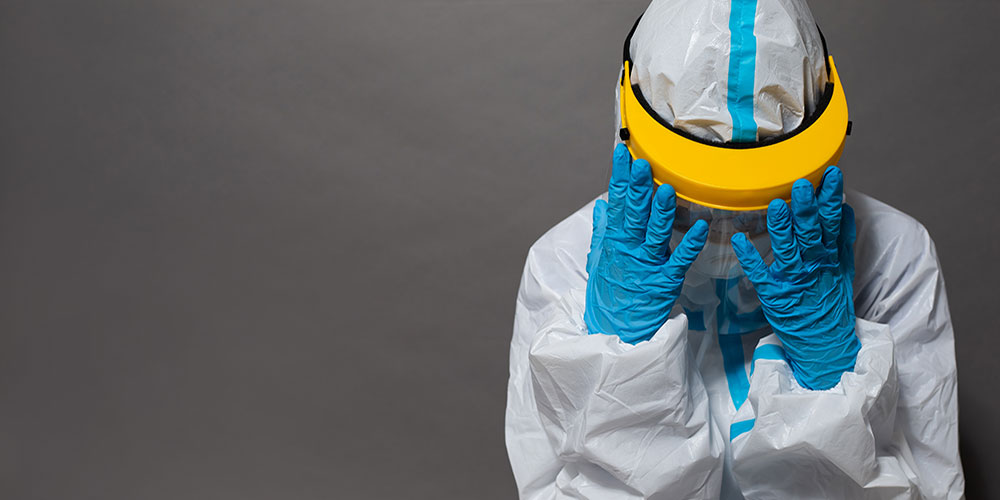Healthcare workers on the front lines of the COVID-19 pandemic suffered from the same type of trauma as combat veterans, researchers found.
The study, published April 5 in the Journal of General Internal Medicine by researchers from Duke University, Vanderbilt University, and the Department of Veterans, was based on data from 618 veterans who served in combat after 9/11 and a new survey of more than 2,000 people who worked in healthcare during the pandemic.
The study found soldiers who experienced combat and healthcare workers who treated patients with COVID both experienced potential mortal injury (PMI) at about the same rate, reports Yahoo News.
Moral injury, which is a type of post-traumatic stress, occurs when someone does something that is against their belief system. Jason Nieuwsma, a lead author on the study and a psychologist with VA and the Duke University School of Medicine, said moral injury can manifest in different ways, including feelings of guilt or shame after having participated in a high-stress situation that required immediate or life-or-death decision-making. It can lead to depression, feelings of isolation, and other psychological conditions
“While ‘burnout’ is often used to describe the effects of ongoing stress in the workplace, moral injury is used to describe the damage done to the conscience or identity of people who might witness, cause, or fail to prevent acts that go against their own moral standards,” Nieuwsma said. “You can imagine, for example, a combat situation where perhaps a service member fired on a vehicle that didn’t stop at a checkpoint only to find out there were civilians in there.”
For healthcare workers during the pandemic, this included staffing shortages, rationing care and personal protective equipment, watching patients die, and not allowing families to visit dying relatives, according to the study. One respondent said he and his colleagues had to ration care for patients “who we thought had the best shot.”
PMI was also reported as a result of seeing others around them refusing to take recommended steps to slow the spread of the virus, according to Spectrum News. Approximately 24% of veterans and 18% of healthcare workers reported being troubled by violating their own morals and values, while 46% of veterans and 51% of healthcare workers indicated being troubled by others’ immoral behavior.
“The worst is people openly expressing mistrust of the medical and scientific community after everything we’ve done for them,” one healthcare worker wrote.
Moral injury can also lead people to lose trust in their comrades or people in authority. A respondent expressed frustration in “community and government responses and participation in CDC guidelines. Cities and states ending mask mandates too early is incredibly disappointing.”
“Morbidity and mortality is increasing for patients WITHOUT covid because of the chaos and lack of accountability throughout the hospital system,” another person wrote. “The excuse is always, ‘things are crazy right now because of Covid.’ Before December, I’d never had a patient die due to physician negligence — I’ve now had two.”
The latest findings align with how psychologists understand moral injury and how it can develop when people think they’ve been betrayed by authorities, according to the study.
“There may be lessons to learn from how we are approaching moral injury at Veterans Affairs,” said Vanderbilt’s Dr. Keith Meador. “Our study is suggestive with respect to the importance of workplace culture and leadership for moral injury in health care. I think the role of the community, whether that be at work or elsewhere, is truly central.”
Brian Klassen, clinical director for a veterans’ program at Chicago’s Rush University Medical Center, said the sense of betrayal regarding moral injury has long been reported among military members, according to Yahoo News.
“The thing we hear a lot is that the leadership doesn’t care about the suffering that is going on,” Klassen said. “Or maybe leadership knew more about the situation and weren’t transparent about the situation a person was going into.”
Although there are therapies that can help, Klassen said awareness and treatments specific to moral injury are lacking.
“What we need to do is work on deploying effective treatments to the populations that need it,” he said. “It’s a formidable challenge, but it’s not insurmountable.”







